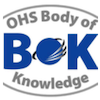Chapter 12.2: OHS Management Systems
Abstract
While organisations implement various programs and initiatives to ensure occupational
health and safety (OHS), they do not always connect them under a systems perspective. An
OHS management system (OHSMS) requires a holistic approach to risk management that is
shared across the organisation. A systems approach provides systematic management for
process consistency while recognising inevitable system variability, the interdependence of
system elements, and the importance of participation and shared learning. A systems
approach can ensure OHS is on par with other organisational business objectives and is
likely to increase the probability of compliance with legal obligations. However,
implementation of an OHSMS does not guarantee improvement in OHS performance, and
the OHS professional should be cognisant of factors that are likely to increase OHSMS
effectiveness. After proposing a definition of OHSMS, and briefly considering the historical
and legislative contexts, this chapter presents an OHSMS element structure, and explores
the outcomes of, first, research evaluating OHSMS effectiveness and, second, a discussion
forum with OHS professionals. Drawing on both the literature and the practical perspective,
the chapter concludes with implications for OHS practice, including a set of guiding
principles for OHSMS development.
Keywords: safety, health, management, system, OHSMS
First year of publication: 2021
Current Version: 2021
Chapter 12.2: OHS Management Systems
Table of contents
| 1 | Introduction |
| 2 | Historical perspective |
| 3.0 | Understanding ‘systems’ |
| 3.1 | System and systematic |
| 3.2 | Systems of work |
| 3.3 | OHS management systems |
| 3.4 | Systems thinking in an OHSMS context |
| 3.5 | System safety |
| 3.6 | System variability |
| 4 | Implications for OHS practice |
| 5 | Summary |
References
Appendix: OHSMS organising elements
List of Figures
Figure 1 OHS management system organising elements
List of Tables
| Table 1 | Summary of OHS management system organising elements |
| Table 2 | OHS management system enablers, barriers and external factors |
| Table 3 | Strengths and weaknesses of OHS management systems as perceived by forum participants |

Nektarios Karanikas DProf, BSc(Hons), MSc, SFHEA, GradIOSH, PMP, CEng, MHFESA, FRAeS
Associate Professor, Queensland University of Technology
Nektarios Karanikas is an Associate Professor in the Health, Safety and Environment discipline of the
School of Public Health and Social Work at QUT. Nektarios has more than 20 years of industry
experience and holds professional qualifications in OHS, human factors, project management and
engineering. He has been a member of various national and international associations and has
(co)authored book chapters and peer-reviewed journal articles and conference papers focusing on
safety/risk management and human factors. Nektarios has presented his work at more than 80
events, and he actively volunteers in a wide range of scientific and professional activities.

Pam Pryor AO BSc, BEd, GDipOHM, MAppSci, ChOHSP, FAIHS
Manager, OHS Body of Knowledge Development, Australian Institute of Health & Safety
With a background in OHS consulting and OHS education, Pam now specialises in OHS capability
and related aspects of OHS professionality. Pam was a key player in the development of the INSHPO
OHS Professional Capability Framework and received the 2017-18 President’s Award from the
American Society of Safety Professionals for this work. Pam received an Officer of the Order of
Australia in 2018 for her contribution to OHS through leadership and advisory roles, particularly in
developing standards for education frameworks.
Pam contributed to this chapter by organising and delivering the OHS professionals’ forum, analysing
and reporting the forum results, and providing suggestions for improving several sections of the
chapter.
Learning Outcomes: Systems
The OHS Body of Knowledge takes a conceptual approach which enables it to be applied in different contexts and frameworks.
To optimise its value for education and professional development learning outcomes have been developed for each technical chapter in the Body of Knowledge.
The learning outcomes as described give an indication of what should be the capabilities of an OHS professional; it is up to those developing OHS education programs, OHS professionals planning their CPD or recruiters or employers selecting or developing people for the OHS function to consider the required breadth vs. depth .
Please read the section on using the learning outcomes before delving into the leaning outcomes of the individual chapters.
The numbers against each learning outcome refer to the chapter number of the BOK download page. No learning outcomes have been developed for the chapters considered introductory or underpinning knowledge (that is chapters 1, 2, 3, 4, 5, 6, 7, 1, .13, 14, 15.)
Download document about BOK Learning Outcomes
Download Learning Outcomes for this Chapter
Videos
AIHS Video: ISO 45001 – Migration Strategy for Australian Businesses
AS NZ ISO 45001 has now been adopted as not only the International Standard for OHS Management Systems. This webinar focuses on the nuances between the previous standards, and what businesses should consider in terms of migration to 45001.
Date: 2019
Presenter: Josh Maxwell, Head of HSE, Growthbuilt
Source: https://www.youtube.com/watch?v=IbR7RinT6YU&t=503s
AIHS Video: ISO 45001 – Getting Ready for the New Standard for OHS Management Systems.
This seminar provides an update associated with ISO 45001. The seminar provides an overview of the key changes associated with migrating from ISO 18001 and AS/NZS 4801 and highlights the key area to ensure they comply.
Date: 2018
Presenter: Mario Machado, National Practice Leader – WHS, People Risk, Melbourne
Source: https://www.youtube.com/watch?v=kQwPwk0iLn8&feature=youtube
AIHS Video: The OHS Professional and Cybersecurity
Cyber security has become increasingly important for companies and Boards . Cyber represents two of the top five risk in the World Economic Forum’s Global Risk Report. Our ever-increasing reliance on biomechanics, automation, artificial intelligence and the Internet of Things has also led to greater awareness of the impact that accidental or malicious cyber events could have on safety-critical systems and the economies and people that rely on them.
Date: 2018
Presenter: Ajoy Ghosh
Source: https://www.youtube.com/watch?v=WqUE_y34E6I&t=242s
Webinars
AIHS Webinar: ISO45001 A global game-changer
A structured approach to managing health and safety means implementing a system and not a standard. Organisations that implement a standard tend to focus on compliance and not effectiveness. The true value of ISO 45001 comes from linking the business strategy and the health and safety management system, and not developing a standalone set of documents. As Australia’s national science agency with a growing international footprint, the CSIRO implemented AS/NZS ISO 45001. This presentation outlines how the CSIRO constructed the elements of the health and safety management system, engaged with workers and interested parties to develop the system, and promoted it.
Date: 2020
Presenter: Angelica Vecchio-Sadus
Source: https://www.youtube.com/watch?v=qIZUfZIGxOI
IChemE ISC Webinar: Safety lore 13: Audits
Discussion on two cases studies that occurred in the past, stressing the key lessons on audits. With useful tips and recommendations as how to avoid future recurrence of such accidents.
Date: 2021
Presenter: Dr Zsuzsanna Gyenes
Source: https://www.youtube.com/watch?v=xwLy9zXl9CM
Podcast
Safety management systems
Safety management systems provide a systematic business-like approach to managing safety elements in the workplace. They are used to continuously identify and monitor hazards, control risks, and to help in the prevention of accidents and injuries. They typically include organisational structures, accountabilities, objectives, plans, policies and procedures.
Date: 2020
Presenter: Sarah-Jane Dunford
Source: https://3mscienceofsafety.libsyn.com/episode-86-safety-management-systems
Safety of Work Podcast: Ep 68 Are safety cases an impending crisis?
Shifting the burden of proof. The notion of ‘anti-safety’. Making the implicit, explicit. Trends of the past. Impediments to research. Variant and process theories. Disrupting beliefs and ideas to create a more favourable outcome. Why collaboration matters.
Date: 2021
Presenter: Drew Rae & David Provan
Source:https://3mscienceofsafety.libsyn.com/episode-86-safety-management-systems
Safety of Work Podcast: Ep 37: How do audits influence intentions to improve practice?
Our feelings about audits. Feedback from the audit process. The format of a cluster-randomized trial. Lab vs. field results. How to act on audit results. Analysing the study’s results.
Date: 2020
Presenter: Drew Rae & David Provan
Source: https://safetyofwork.com/episodes/ep37-how-do-audits-influence-intentions-to-improve-practice

